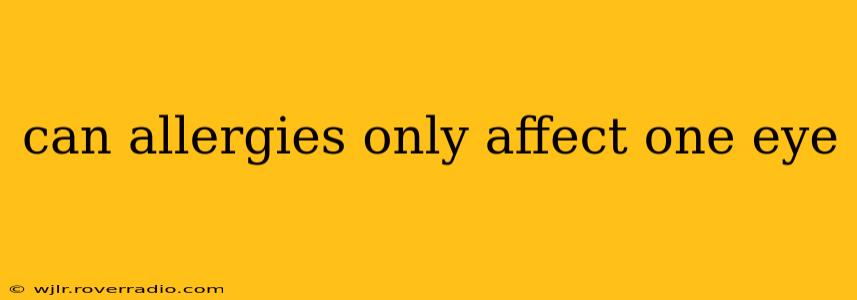It's a common question: can allergies affect just one eye? The short answer is yes, although it's less common than allergies impacting both eyes. When allergies affect only one eye, it's referred to as unilateral allergic conjunctivitis. While bilateral allergic conjunctivitis (affecting both eyes) is more typical, understanding why unilateral symptoms can occur is crucial for proper diagnosis and treatment.
Why Would an Allergy Only Affect One Eye?
Several factors can contribute to an allergy affecting only one eye:
-
Asymmetrical Exposure: This is perhaps the most frequent reason. Imagine you're cutting onions – you might only rub one eye, exposing it more to irritants. Similarly, pollen or pet dander might concentrate on one side of your face due to wind direction or proximity to the allergen source. Even something as simple as rubbing your eye after touching an allergen can trigger a reaction in just that eye.
-
Underlying Eye Condition: A pre-existing condition in one eye, such as a corneal abrasion or dry eye, might make it more susceptible to allergic reactions. The inflammation from the existing condition could lower the threshold for an allergic response.
-
Blocked Tear Duct: A blockage in a tear duct in one eye can lead to an accumulation of irritants, increasing the likelihood of an allergic reaction in that specific eye. This imbalance in tear drainage can exacerbate an allergic response.
-
Infection in One Eye: Sometimes, what initially appears to be a unilateral allergic reaction might actually be a secondary infection in one eye. Bacterial or viral conjunctivitis can mimic allergic symptoms, creating the impression of a one-sided allergy.
-
Rare Cases: In rare instances, underlying neurological conditions could affect the autonomic nervous system, potentially influencing the unilateral nature of an allergic reaction. This is less frequent and would require a thorough medical evaluation.
How is Unilateral Allergic Conjunctivitis Diagnosed?
Diagnosing unilateral allergic conjunctivitis involves a thorough eye examination by an ophthalmologist or optometrist. They'll consider your medical history, perform a visual inspection of your eyes, and might conduct allergy testing to confirm the cause. It's crucial to differentiate it from other eye conditions, as mentioned above, to ensure appropriate treatment.
What are the Symptoms of Unilateral Allergic Conjunctivitis?
Symptoms of unilateral allergic conjunctivitis are similar to those of bilateral allergic conjunctivitis but are confined to one eye. These symptoms can include:
- Itching: This is often the most prominent symptom.
- Redness: The affected eye will appear red and inflamed.
- Watering: Excessive tearing may occur.
- Swelling: The eyelids might be swollen.
- Discharge: A clear or slightly stringy discharge might be present.
Can Unilateral Eye Allergies Be Treated?
Yes, treatment options for unilateral allergic conjunctivitis are similar to those for bilateral allergic conjunctivitis. These often include:
- Antihistamine eye drops: These help reduce itching and inflammation.
- Mast cell stabilizers: These prevent the release of histamine, reducing allergic symptoms.
- Cold compresses: Applying cold compresses can soothe the inflamed eye.
- Artificial tears: These help lubricate the eye and alleviate dryness.
- Identifying and Avoiding Allergens: This is a crucial step in managing allergies.
When Should I See a Doctor?
While many mild allergic reactions resolve on their own, consult a doctor if:
- Your symptoms are severe or persistent.
- You experience vision changes.
- You suspect an infection.
- Over-the-counter treatments are ineffective.
This information is for general knowledge and does not constitute medical advice. Always consult a healthcare professional for diagnosis and treatment of any medical condition.
